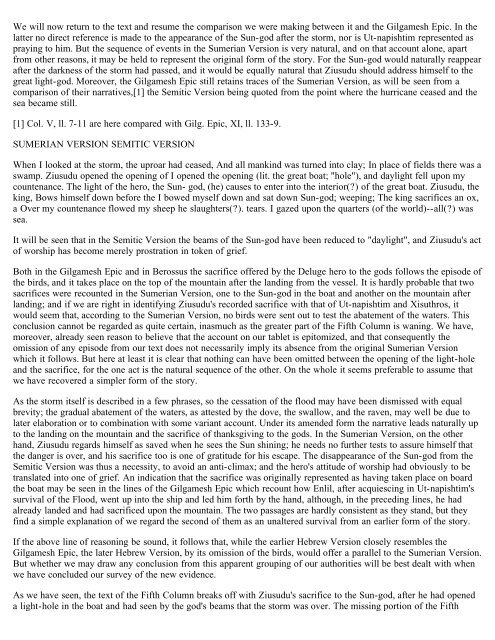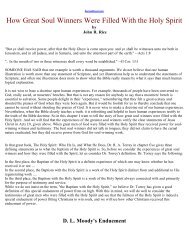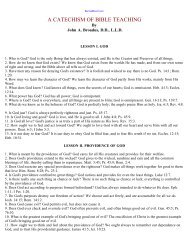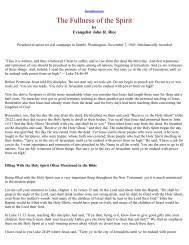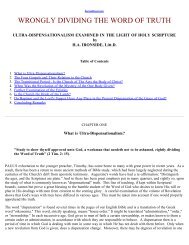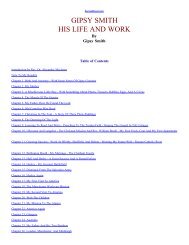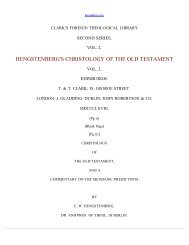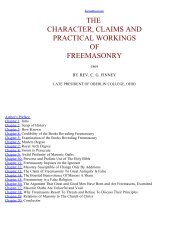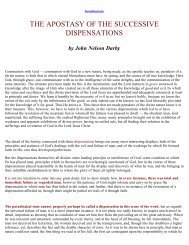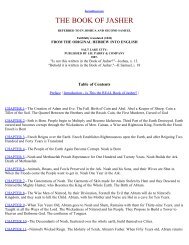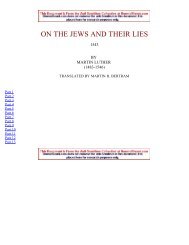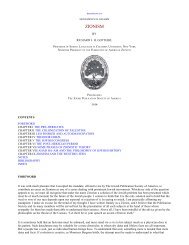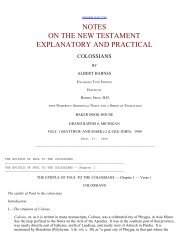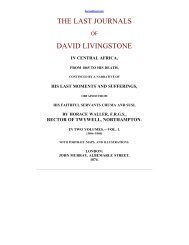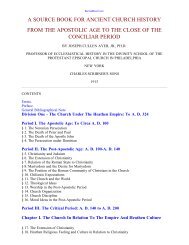Legends of Babylon and Egypt in Relation to Hebrew Tradition.pdf
Legends of Babylon and Egypt in Relation to Hebrew Tradition.pdf
Legends of Babylon and Egypt in Relation to Hebrew Tradition.pdf
Create successful ePaper yourself
Turn your PDF publications into a flip-book with our unique Google optimized e-Paper software.
We will now return <strong>to</strong> the text <strong>and</strong> resume the comparison we were mak<strong>in</strong>g between it <strong>and</strong> the Gilgamesh Epic. In the<br />
latter no direct reference is made <strong>to</strong> the appearance <strong>of</strong> the Sun-god after the s<strong>to</strong>rm, nor is Ut-napishtim represented as<br />
pray<strong>in</strong>g <strong>to</strong> him. But the sequence <strong>of</strong> events <strong>in</strong> the Sumerian Version is very natural, <strong>and</strong> on that account alone, apart<br />
from other reasons, it may be held <strong>to</strong> represent the orig<strong>in</strong>al form <strong>of</strong> the s<strong>to</strong>ry. For the Sun-god would naturally reappear<br />
after the darkness <strong>of</strong> the s<strong>to</strong>rm had passed, <strong>and</strong> it would be equally natural that Ziusudu should address himself <strong>to</strong> the<br />
great light-god. Moreover, the Gilgamesh Epic still reta<strong>in</strong>s traces <strong>of</strong> the Sumerian Version, as will be seen from a<br />
comparison <strong>of</strong> their narratives,[1] the Semitic Version be<strong>in</strong>g quoted from the po<strong>in</strong>t where the hurricane ceased <strong>and</strong> the<br />
sea became still.<br />
[1] Col. V, ll. 7-11 are here compared with Gilg. Epic, XI, ll. 133-9.<br />
SUMERIAN VERSION SEMITIC VERSION<br />
When I looked at the s<strong>to</strong>rm, the uproar had ceased, And all mank<strong>in</strong>d was turned <strong>in</strong><strong>to</strong> clay; In place <strong>of</strong> fields there was a<br />
swamp. Ziusudu opened the open<strong>in</strong>g <strong>of</strong> I opened the open<strong>in</strong>g (lit. the great boat; "hole"), <strong>and</strong> daylight fell upon my<br />
countenance. The light <strong>of</strong> the hero, the Sun- god, (he) causes <strong>to</strong> enter <strong>in</strong><strong>to</strong> the <strong>in</strong>terior(?) <strong>of</strong> the great boat. Ziusudu, the<br />
k<strong>in</strong>g, Bows himself down before the I bowed myself down <strong>and</strong> sat down Sun-god; weep<strong>in</strong>g; The k<strong>in</strong>g sacrifices an ox,<br />
a Over my countenance flowed my sheep he slaughters(?). tears. I gazed upon the quarters (<strong>of</strong> the world)--all(?) was<br />
sea.<br />
It will be seen that <strong>in</strong> the Semitic Version the beams <strong>of</strong> the Sun-god have been reduced <strong>to</strong> "daylight", <strong>and</strong> Ziusudu's act<br />
<strong>of</strong> worship has become merely prostration <strong>in</strong> <strong>to</strong>ken <strong>of</strong> grief.<br />
Both <strong>in</strong> the Gilgamesh Epic <strong>and</strong> <strong>in</strong> Berossus the sacrifice <strong>of</strong>fered by the Deluge hero <strong>to</strong> the gods follows the episode <strong>of</strong><br />
the birds, <strong>and</strong> it takes place on the <strong>to</strong>p <strong>of</strong> the mounta<strong>in</strong> after the l<strong>and</strong><strong>in</strong>g from the vessel. It is hardly probable that two<br />
sacrifices were recounted <strong>in</strong> the Sumerian Version, one <strong>to</strong> the Sun-god <strong>in</strong> the boat <strong>and</strong> another on the mounta<strong>in</strong> after<br />
l<strong>and</strong><strong>in</strong>g; <strong>and</strong> if we are right <strong>in</strong> identify<strong>in</strong>g Ziusudu's recorded sacrifice with that <strong>of</strong> Ut-napishtim <strong>and</strong> Xisuthros, it<br />
would seem that, accord<strong>in</strong>g <strong>to</strong> the Sumerian Version, no birds were sent out <strong>to</strong> test the abatement <strong>of</strong> the waters. This<br />
conclusion cannot be regarded as quite certa<strong>in</strong>, <strong>in</strong>asmuch as the greater part <strong>of</strong> the Fifth Column is wan<strong>in</strong>g. We have,<br />
moreover, already seen reason <strong>to</strong> believe that the account on our tablet is epi<strong>to</strong>mized, <strong>and</strong> that consequently the<br />
omission <strong>of</strong> any episode from our text does not necessarily imply its absence from the orig<strong>in</strong>al Sumerian Version<br />
which it follows. But here at least it is clear that noth<strong>in</strong>g can have been omitted between the open<strong>in</strong>g <strong>of</strong> the light-hole<br />
<strong>and</strong> the sacrifice, for the one act is the natural sequence <strong>of</strong> the other. On the whole it seems preferable <strong>to</strong> assume that<br />
we have recovered a simpler form <strong>of</strong> the s<strong>to</strong>ry.<br />
As the s<strong>to</strong>rm itself is described <strong>in</strong> a few phrases, so the cessation <strong>of</strong> the flood may have been dismissed with equal<br />
brevity; the gradual abatement <strong>of</strong> the waters, as attested by the dove, the swallow, <strong>and</strong> the raven, may well be due <strong>to</strong><br />
later elaboration or <strong>to</strong> comb<strong>in</strong>ation with some variant account. Under its amended form the narrative leads naturally up<br />
<strong>to</strong> the l<strong>and</strong><strong>in</strong>g on the mounta<strong>in</strong> <strong>and</strong> the sacrifice <strong>of</strong> thanksgiv<strong>in</strong>g <strong>to</strong> the gods. In the Sumerian Version, on the other<br />
h<strong>and</strong>, Ziusudu regards himself as saved when he sees the Sun sh<strong>in</strong><strong>in</strong>g; he needs no further tests <strong>to</strong> assure himself that<br />
the danger is over, <strong>and</strong> his sacrifice <strong>to</strong>o is one <strong>of</strong> gratitude for his escape. The disappearance <strong>of</strong> the Sun-god from the<br />
Semitic Version was thus a necessity, <strong>to</strong> avoid an anti-climax; <strong>and</strong> the hero's attitude <strong>of</strong> worship had obviously <strong>to</strong> be<br />
translated <strong>in</strong><strong>to</strong> one <strong>of</strong> grief. An <strong>in</strong>dication that the sacrifice was orig<strong>in</strong>ally represented as hav<strong>in</strong>g taken place on board<br />
the boat may be seen <strong>in</strong> the l<strong>in</strong>es <strong>of</strong> the Gilgamesh Epic which recount how Enlil, after acquiesc<strong>in</strong>g <strong>in</strong> Ut-napishtim's<br />
survival <strong>of</strong> the Flood, went up <strong>in</strong><strong>to</strong> the ship <strong>and</strong> led him forth by the h<strong>and</strong>, although, <strong>in</strong> the preced<strong>in</strong>g l<strong>in</strong>es, he had<br />
already l<strong>and</strong>ed <strong>and</strong> had sacrificed upon the mounta<strong>in</strong>. The two passages are hardly consistent as they st<strong>and</strong>, but they<br />
f<strong>in</strong>d a simple explanation <strong>of</strong> we regard the second <strong>of</strong> them as an unaltered survival from an earlier form <strong>of</strong> the s<strong>to</strong>ry.<br />
If the above l<strong>in</strong>e <strong>of</strong> reason<strong>in</strong>g be sound, it follows that, while the earlier <strong>Hebrew</strong> Version closely resembles the<br />
Gilgamesh Epic, the later <strong>Hebrew</strong> Version, by its omission <strong>of</strong> the birds, would <strong>of</strong>fer a parallel <strong>to</strong> the Sumerian Version.<br />
But whether we may draw any conclusion from this apparent group<strong>in</strong>g <strong>of</strong> our authorities will be best dealt with when<br />
we have concluded our survey <strong>of</strong> the new evidence.<br />
As we have seen, the text <strong>of</strong> the Fifth Column breaks <strong>of</strong>f with Ziusudu's sacrifice <strong>to</strong> the Sun-god, after he had opened<br />
a light-hole <strong>in</strong> the boat <strong>and</strong> had seen by the god's beams that the s<strong>to</strong>rm was over. The miss<strong>in</strong>g portion <strong>of</strong> the Fifth


